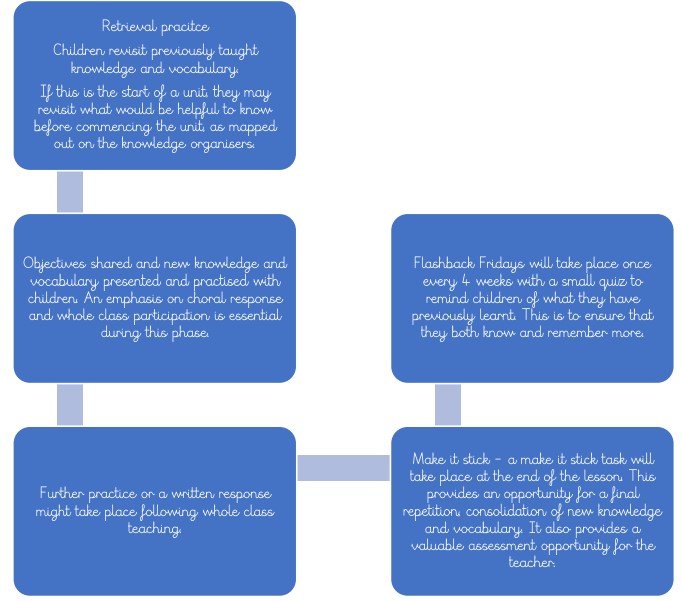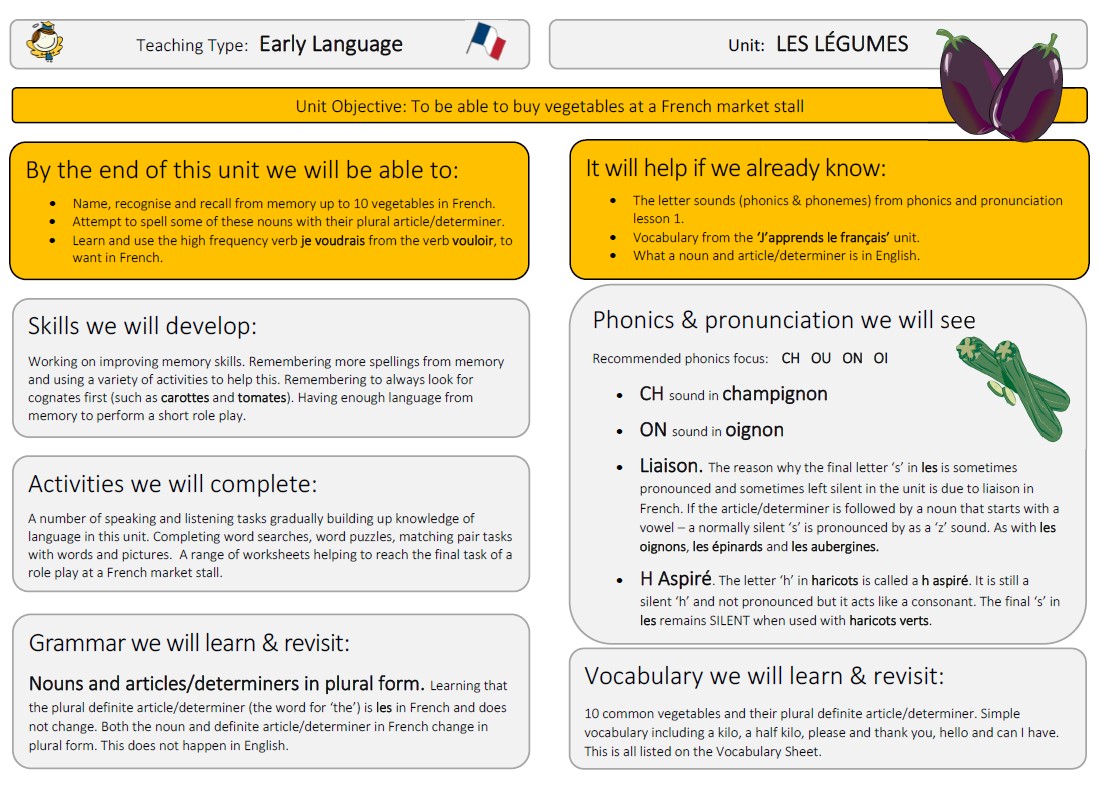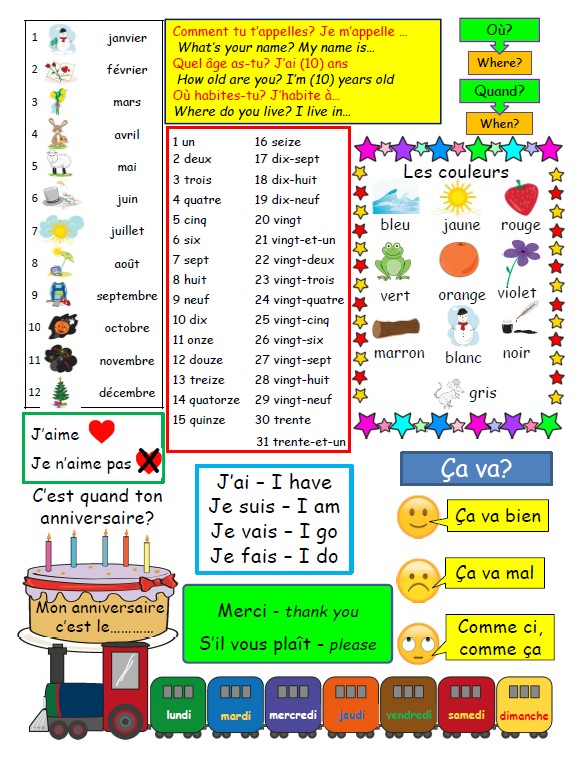French
In order to successfully deliver our MFL curriculum in KS2, we use the Language Angels materials to support our curriculum intent and delivery. Our language focus is French as this is taught within the main secondary schools that we send our children to.
Why Language Angels?
Language Angels provides an exciting and age-appropriate scheme with supportive native audio attached to well-prepared lesson resources. All the tools and knowledge required for the successful teaching and learning are available for all staff to utilise, regardless of whether French is their particular specialism. Ongoing support videos and CPD are regularly uploaded to the online platform.
Three pillars of language learning
The three key pillars of language learning, phonics, grammar and vocabulary, are all built into our scheme. As pupils progress through the scheme, prior language is recycled, revisited and consolidated. New vocabulary and language is introduced gradually before being used in an increasingly complex and sophisticated manner.
Three Key Teaching Types
There are three key teaching types within the scheme: early learning units, intermediate units and progressive units. As pupils gradually progress through the teaching types, they increase their knowledge of French and can gradually understand, say and write more.
Early Learning Units
Early Units are aimed at classes that are just commencing their MFL learning journey. These lessons predominately focus on vocabulary, single nouns (with determiners), building up retention of the basics and formulating very short simple sentences from memory.
Intermediate units
Intermediate units build on the Early Learning Units and work at phrase level. More grammar is included within lessons. There is an increase in the length of reading and listening tasks and there is an increase in the requirement for oral responses and written work.
Progressive units
Progressive units are our most challenging units and are aimed at Years 5 and 6 on the basis that they have good foundations in place. These lessons include a greater amount of content and more language is presented and shared with children. Children are encouraged to write lengthier pieces of writing and they are expected to speak more fluently and accurately from memory. Previously taught units are revisited as children are expected to use this vocabulary in their new units.
Long-term overview
The long-term overview maps out the core, early language, intermediate and progressive units that each phase of KS2 will cover. In each cycle, children begin with 2 French phonics lessons followed by their first full unit.
Composites and components
Composites, relating to the National Curriculum, are top level outcomes which involve a range of knowledge and skills. Each of these composites is made up of its constituent parts known as the components. These components need to be logically sequenced so that all children can build upon previous learning and apply prior knowledge and skills. Teachers use these component parts to drive the teaching content of their lessons. This ensures that children develop a coherent body of knowledge within each unit.
Click on the buttons below to view the MFL/French composites and components.
Knowledge organisers
French knowledge organisers map out what the children will know and be able to do by the end of each unit. The knowledge organisers outline the grammar that children will revisit and will see in the unit and the phonics and pronunciation children will encounter. A section on each knowledge organiser labelled ‘It will help if we already know…” maps out the required knowledge prior to commencing the unit. It might be appropriate for teachers to revisit this knowledge prior to beginning the unit to address any gaps. This can be built into the retrieval practice within the unit too. These knowledge organisers are a useful summary for teachers rather than a resource for children to use.
Click the image below to view an example of a knowledge organiser.
Vocabulary mats
Vocabulary mats map out the key vocabulary that the children will explore and be expected to know and remember by the end of each unit. Regular retrieval practice within and throughout each unit will allow the children to revisit and consolidate previously taught vocabulary so that they know and remember more. At points throughout each unit, children will engage in retrieval practice of the core vocabulary. This vocabulary includes some of key basics such as months, days, colours and basic questions including ‘How are you?’ and ‘What is your name?’. These are accompanied by a range of appropriate responses.

Click the image to view the core vocabulary mat
Progression Map
The Language Angels Progression Map shows learning across each of the key skills of SPEAKING, LISTENING, READING, WRITING and GRAMMAR progresses within each Language Angels Teaching Type. It also shows how the level of learning and progression of each pupil is increased as pupils move across each subsequently more challenging Language Angels Teaching Type from Early Language to Intermediate and on to Progressive.
It is a visual demonstration of the progression that takes place in each of the key language learning skills in TWO ways: 1. WITHIN a Teaching Type and 2. ACROSS each Teaching Type. Progression WITHIN a Teaching Type is demonstrated by the downward pointing arrows in the Progression Map. These show how each skill develops and increases in level of challenge WITHIN a Teaching Type. This effectively shows how each skill is developed within each primary school year. Progression ACROSS a Teaching Type is demonstrated by the arrows pointing to the right in the Progression Map. These show how each skill develops and increases in level of challenge ACROSS a Teaching Type. This effectively shows how each skill is developed as pupils move through the various primary school years.
Assessment of French
French is assessed formatively throughout each lesson. Teachers regularly question to check for children's understanding and use verbal feedback to address any errors or misconceptions. The learning tasks that children tackle during their French lessons provide teachers with the opportunity to assess in-lesson performance and to check long-term retention of new knowledge and vocabulary. Retreival practice allows teachers to check children's knowledge from previous lessons and units and 'Make it stick' summaries allow teachers to assess children's performance during a particular lesson. Monthly Flashback Fridays provide a further opportunity to assess long-term retention of knowledge and end of unit quizzes are used to assess whether children know and remember more.
Subject on a page
Click the button below to view our MFL 'subject on a page' document which summarises our curriculum intent and implementation.
Implementation model - see the implementation model below.







